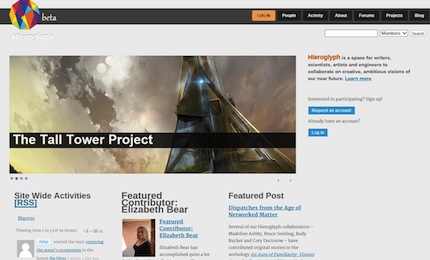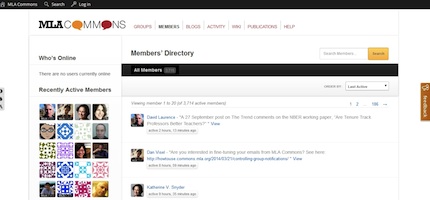Open Source Commons in a Box Keeps Academics Connected
This platform provides a free, easy-to-install digital commons site for colleges and universities (and others) to create spaces where members can discuss issues, collaborate on projects, and share their work. But it's also helping people keep control of their own content.
- By Dian Schaffhauser
- 04/21/14
Though they all ultimately had the same employer, up until about four years ago, researchers and scholars working within the City University of New York system may not have known about each other, even if they worked worked in the same discipline. After all, the system has 24 campuses. So the institution created a digital commons space across CUNY where faculty members, graduate students, and staff could connect and collaborate across campuses. The CUNY Academic Commons currently hosts 561 unique groups; 4,912 active members; 1,111 blogs; and uncounted numbers of papers, documents, reports, news items and other creations generated by people who want to meet each other within CUNY, connect and share what they're working on.
So many people were "impressed" by the Commons and wanted to copy the idea for their own schools, the team behind the Academic Commons embarked on a follow-up project to create a "more abstracted version of it that would allow people to create something like it on their own campuses." Funded by an Alfred P. Sloan Foundation grant, the resulting application, Commons in a Box (CBOX), is open source and freely available. In its first year of availability the commons platform has been downloaded "something like 8,200 times," said CBOX project director Matthew Gold, who is also an associate professor of English and Digital Humanities at CUNY's New York City College of Technology and the Graduate Center.
Among the users: the Modern Language Association, the 30,000-member organization for scholars of literature and language; Arizona State University's Hieroglyph project, which brings together writers, scientists, artists and engineers to consider a "more optimistic future"; Advanced Computational Methods for Strongly Correlated Quantum Systems, a global network of researchers working in the area of high-performance computing hardware; and the students in "Engl 390," a digital humanities course offered last school year by English Professor Paul Schacht at the State University of New York Geneseo.


The Hieroglyph Commons (top) and the MLA Commons. |
In other words, CBOX has drawn usage among academic groups, institutional organizations, individual faculty members and even non-profits.
"Our goal was to make something that was easy to install and easy to customize," said Schacht. "So we got the funding; we created the prototype; and we released the tool. To be honest, we didn't really know how it was going to be used."
What's Inside the Box
The out-of-the box functionality includes, among other features:
- A customizable "theme" or design developed for community engagement;
- Portability across platforms, including tablets and smart phones;
- Collaborative document creation and file sharing;
- A plugin that allows members to be notified when updates are made or to respond via e-mail;
- Member and group management;
- Extensive privacy layers for groups, members, blogs and posts; and
- Wiki options.
The platform was built on top of blogging software WordPress and WordPress social toolset BuddyPress. According to Gold, CBOX acts as a "plug-in manager" that aggregates the plugins needed for commons functionality. Since there are more than 500 BuddyPress plugins in the WordPress repository, CBOX selected the best ones to work within a commons community, such as plugins for file sharing within groups and for organizing content.
Gold insisted that installation of CBOX is "pretty easy." "If you can install a WordPress platform on your own server, you can get the CBOX up and running in just a couple of minutes." In fact, he added, it's almost "too easy." Some people get the communities up and running without much knowledge of HTML or CSS, which means CBOX does a thriving business in supporting its community of users.
Connecting Commons
For a next generation of CBOX, Gold said he sees three directions worth pursuing in the near future. First, the development team wants to figure out better ways to connect members to scholarship and let them share their work with one another more simply, such as auto-e-mailing alerts about new uploads of journal drafts posted by members and letting other members provide feedback.
Second, the team would like to create versions of the CBOX theme "tailored for specific communities." For instance, Gold offered, "What would a STEM version of CBOX look like? That might come with plugins you'd need for mathematical notation or a theme built so that it looks more like the kind of site that scientists might be interested in using. What would a teaching version of CBOX look like? Or what would a version specifically designed for non-profits look like? Maybe it would have special reporting tools that non-profits could use to report to their funders or members."
Third, the team is working on the idea of federation, creating relationships among various commons installations. In this area, CBOX is getting a boost by the MLA, which recently received its own grant from the Mellon Foundation to create a "Humanities Commons." This project will allow scholarly associations to network their commons for sharing information across those Web sites by addressing technical issues such as how to sync member databases with membership in a commons space. The CBOX team is participating with MLA and other organizations in developing a governance structure and support model for that work.
Maintaining Control over Community Platforms
Many of the plugins used by CBOX have been developed by the CBOX developers and released back to the WordPress and BuddyPress communities. "We're very proud to participate in the free software movement," noted Gold. "We believe that universities have a very important role to play in protecting the open Web."
In this regard, Gold said, he agrees with Jonathan Zittrain. Co-director of Harvard's Berkman Center for Internet & Society, Zittrain puts forth an argument in his book The Future of the Internet and How To Stop It that computing in a cloud-dominated Internet are steering us toward an ecosystem under the control of businesses pushing users into "black box" operating systems and apps and pulling us further and further from the World Wide Web's origins as an experiment in open connections.
"We want to ensure that we don't wind up in what [Zittrain] has called the 'appliance-sized Web,' where it's just all apps that we have no control over, where we're basically giving our content over to private companies that are mining that data for advertising or for who knows what," Gold explained.
For Gold, the digital humanist, CBOX is about more than making software available free to universities and other organizations. It's about giving people "control over their own means of instantiation." If people are using corporate-built proprietary solutions to communicate, share, and collaborate with each other, "I'd ask them to think about who owns their data, how their data is being used, and whether it wouldn't be in their interest and the interest of their institutions to really have more control over their own community platforms."